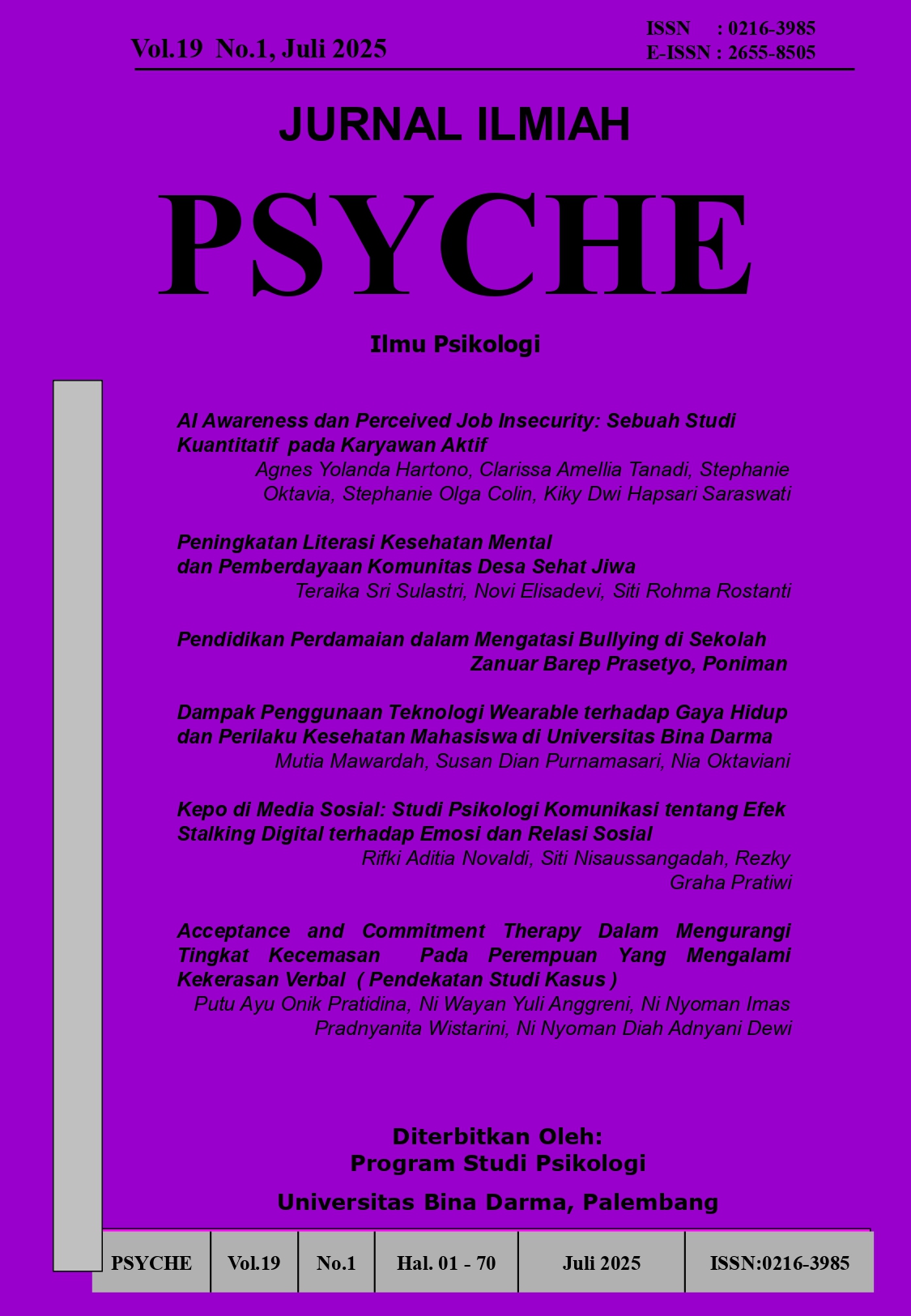Pendidikan Perdamaian dalam Mengatasi Bullying di Sekolah
DOI:
https://doi.org/10.33557/tw6r5750Keywords:
Peace Education, Bullying, SchoolAbstract
Peace education has become a major focus in efforts to prevent violence and build positive character in young people. This study aims to explore the effect of peace education programs on reducing bullying behavior in schools. This study uses a qualitative approach with a case study design, involving in-depth interviews with teachers, students, and education practitioners. Data were collected through semi-structured interviews, observations, and documentation related to the implementation of peace education programs in several schools in Indonesia. The results of the study indicate that peace education programs that focus on developing empathy, social skills, and non-violent communication can significantly reduce bullying incidents, improve relationships between students, and create a more positive school climate. These findings indicate the importance of value education and emotional skills in creating a safe and inclusive learning environment. The contribution of this study lies in providing empirical evidence on the effectiveness of peace education programs in the context of Indonesian education, as well as its implications for education policy and the development of social programs in schools.
References
Creswell, J. W. (2021). A concise introduction to mixed methods research. SAGE publications.
Creswell, J. W., & Poth, C. N. (2018). Creswell, John W (hal. 1–459).
Galtung, J., & Fischer, D. (2013). Johan Galtung: Pioneer of Peace Research. Johan Galtung. https://doi.org/10.1007/978-3-642-32481-9
Garg, S., & Chaudhary, R. (2024). Silent Struggles: Unveiling the Effects of Bullying on Secondary Students. International Journal For Multidisciplinary Research. https://doi.org/10.36948/ijfmr.2024.v06i03.21327
Goleman D, B. R. and M. A. (2002). The New Leader. The Power Emotional Intelligence in Managing Organizations. Greek Letters.
Herly, J. L. (2019). Penerapan Teori Belajar Sosial Albert Bandura Dalam Proses Belajar Mengajar Di Sekolah. KENOSIS: Jurnal Kajian Teologi, 4(2), 186–202. https://doi.org/10.37196/kenosis.v4i2.67
Jumra, Rasyid, M., Baharuddin, A., & Arifullah. (2025). The Dynamics of Bullying in Schools: Causes, Impacts, and Prevention Strategies. Journal of Indonesian Scholars for Social Research. https://doi.org/10.59065/jissr.v5i1.176
Juvonen, J., Schacter, H. L., Sainio, M., & Salmivalli, C. (2016). Can a school-wide bullying prevention program improve the plight of victims? Evidence for risk × intervention
effects. In Journal of consulting and clinical psychology: Vol. 84 6 (hal. 483). https://doi.org/10.1037/ccp0000116
Lino, G. M. L., Da, C. L., & Maria, J. S. (2024). Assessment of Education for peace and ethical learning at school. Ensaio: Avaliação e Políticas Públicas em Educação. https://doi.org/10.1590/s0104-40362024003204232
Media, S., Society, D., & Kingdom, U. (2020). Submission in response to The Democratic Unionist Party ’ s - Examining online harassment and cyber bullying Pre-Consultation Paper. Monash University, March, 1–6.
Poniman., Suryanadi., J., Ardianto., H., & Gautama, S. A. (2023). The Influence of Emotional Intelligence on the Professionalism of SMKN Teachers in Bandar Lampung City. Journal of Adaptive Education, 1(January), 21–28.
Punia, N., Dutta, J., & Sharma, Y. (2015). Emotional Intelligence: A Theoretical framework. International Journal of Scientific & Engineering Research, 6(5), 967–1006. http://www.ijser.org
Purnama, D., & Nurbayti, F. (2024). Dangers of Bullying in Teenagers and How to Prevent It. AURELIA: Jurnal Penelitian dan Pengabdian Masyarakat Indonesia. https://doi.org/10.57235/aurelia.v4i1.5022
Ramadhani, S., Zainuddin, & Nasrun. (2023). Bullying Instability Towards the Students’ Mentality in Indonesia: Is the Peace Education Piloted the Right Solution? Journal of Namibian Studies : History Politics Culture. https://doi.org/10.59670/jns.v34i.1307
Saadah, M., Irawan, E., Fitria, N., & Asyifa, N. (2020). Meningkatkan Konsep Diri Positif Siswa Melalui Layanan Bimbingan Kelompok Dengan Teknik Rasional Emotif Behavior. Jurnal Fokus Konseling, 6(2), 108–114.
Sawyer, J.-L., Mishna, F., Pepler, D., & Wiener, J. (2011). The missing voice: Parents’ perspectives of bullying. Children and Youth Services Review, 33, 1795–1803. https://doi.org/10.1016/J.CHILDYOUTH.2011.05.010
Yusufi, A. (2018). Implementasi Model Islamic Peace Education di SD Islam Ta’allumul Huda Bumiayu. INSANIA : Jurnal Pemikiran Alternatif Kependidikan. https://doi.org/10.24090/INSANIA.V23I1.2013
Downloads
Published
Issue
Section
License

Jurnal Ilmiah Psyche by http://journal.binadarma.ac.id/index.php/jurnalpsyche is licensed under a Creative Commons Attribution-ShareAlike 4.0 International License.









